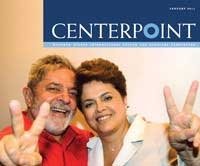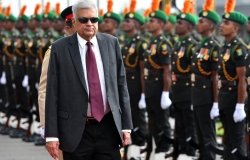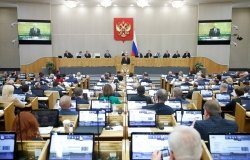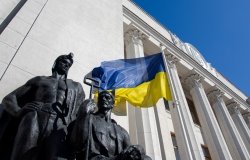Brazil Elects First Female President
Brazil has just sworn in its first female president, Dilma Rousseff, who follows on the heels of the ever-popular outgoing President Luiz Inácio Lula da Silva. Panelists at several recent Brazil Institute events speculate on the challenges and priorities of the new administration.

On January 1, Dilma Rousseff was sworn in as the first female president of Brazil. Having defeated her opponent José Serra by 12 percent, Rousseff succeeded the popular President Luiz Inácio Lula da Silva. What challenges lie ahead for Rousseff? What can the country and the world expect from her administration? Does Rousseff share Lula's international aspirations? The Wilson Center's Brazil Institute has held several meetings in recent months, leading up to the election and inauguration, to examine some of these questions.
Domestic Politics of the Incoming Government
President Dilma Rousseff will govern with the support of a heterogeneous political alliance of 10 parties that will control 60 percent of the seats in both houses of Congress. Panelists at a November 17 Brazil Institute meeting agreed that managing such a complex political alliance will be a difficult task.
At this meeting, Brazil scholar David Fleischer, professor emeritus at the University of Brasília, reviewed the results of the October 31 election, highlighting the regional differences in support for the presidential candidates: Rousseff was heavily favored in the poorer areas of the north and northeast, while rival José Serra won in the wealthier states of the south and southeast.
Fleischer underscored the comfortable majorities Rousseff has in both houses of Congress–larger leads than her predecessor ever enjoyed. This majority is attributed mainly to extensive campaigning efforts for congressional candidates by Lula. The downside of this large governing majority is that it will, in some ways, make managing a government more difficult, observed Fleischer. Political parties and politicians will expect political favors such as committee assignments, ministries with large budgets, and other allocations in return for their support of Rousseff's legislative initiatives.
In the weeks after the election, the transition team filtered nominations for various posts among the 37 seats in the president's cabinet. Fleischer correctly anticipated that some members of Lula's team, such as Guido Mantega, current finance minister, and Defense Minister Nelson Jobim, would remain in their posts. He also accurately predicted that former Finance Minister Antonio Palocci, a key member of Rousseff's campaign and transition staff, would be nominated as presidential chief of staff, the principal minister of the cabinet. Another factor that influenced Rousseff's selections was her promise to have women ministers in one-third of her ministries, which would be an enormous increase compared to Lula's government in which only 3 of the 37 ministers were women.
At an October 20 event, Brazil's Minister of the Environment Izabella Teixera, who was asked by Rousseff to stay on, stressed the need for sustainable development policies, from food production and energy security to combating climate change, all of which rely on a diverse array of natural resources. She said challenges ahead include: transitioning to a low-carbon economy; creating a path to sustainable logging to help prevent deforestation; addressing desertification; and creating new urban policies that take into account human development and population density.
At the November 17 event, Fleischer noted numerous challenges the Rousseff administration will need to tackle in 2011. They include massive infrastructure investment; political, tax, and pension reform; federal-state relations; controlling government expenditures despite enormous pressure to increase them; reducing poverty; handling the global currency exchange war; and developing industrial policy for key sectors of the economy.
Commentator Kellie Meiman, managing director of McLarty Associates, emphasized the immediacy of managing priorities, given the large array of challenges. Meiman said as Rousseff sets her agenda, she will need to balance four competing interests: the governing coalition, state governors, Brazil's needs, and public demands.
Public opinion surveys reveal that average Brazilians want a continuation of Lula's policies, more specifically, sustaining economic growth, managing infrastructure investments, and deepening social policy. She observed that, while Rousseff inherited a positive situation, it will become increasingly difficult to balance economic and social goals. For example, said Meiman, how can Rousseff continue to invest heavily while reigning in government spending to allow the Central Bank to reduce Brazil's high interest rates? Economic concerns will impel her to narrow her agenda, predicted Meiman, so such issues as foreign policy and education will probably take the back burner.
Bryan McCann, a historian of Brazil and professor at Georgetown University, said Rousseff's greatest challenge will be managing her own coalition. Her Brazilian Democratic Party Movement (PMDB) consists of important regional figures who wield a large amount of influence. But the PMDB's lack of a dominant ideology or major national figure means it must always be allied to another party. A prime example is the PMDB governor of the state of Rio de Janeiro who loyally backed Rousseff during the elections and is now demanding a greater percentage of the revenues from pre-salt oil development, which may also indicate future challenges of allocating oil income. McCann said this incident helps underscore the need for political reform, and the growing popular frustration with politics, despite Lula's stratospheric approval ratings.
Implications of the Election
Professor Riordan Roett of SAIS at Johns Hopkins University said at an October 4 Wilson Center event that a Rousseff win could mean passage of a reform agenda and forward momentum domestically. But on the foreign policy front, an issue that could plague the incoming president is Brazil-U.S. relations, currently damaged by divergences over Iran.
Roett said, "The United States will have to come to grips with the fact that this is a new Brazil that is playing a very important role regionally and internationally."
At a November 1 Brazil Institute meeting, Roett said Rousseff's challenges will include inefficient infrastructure and flaws in education, which impair productivity and competitiveness. Roett concurred with other panelists who said internal issues, especially fiscal ones, are likely to take center stage.
João Augusto de Castro Neves, founding partner and political analyst for CAC Consultoria, looked at the future of the opposition during Rousseff's government. He noted she was the first president-elect not favored by the media, which uncovered corruption scandals tied to her staff and questioned her track record since she had not previously run for public office. He echoed other speakers at recent events, saying that despite Rousseff's comfortable majority in the Congress, she face difficulties managing her diverse coalition.
"Even if Rousseff was more left-wing than Lula, PMDB will serve as an anchor to her party," Castro Neves argued. "She won't have that much freedom." As for Lula's role in Rousseff`s government, Castro Neves expects Lula to distance himself from her government in case of an economic crisis.
Wilson Center Brazil Institute Director Paulo Sotero said Rousseff's acceptance speech offered hints on how her government will deal with key issues such as commitment to human rights. "Her strong statement in the defense of freedom of expression in Brazil reflects not only her convictions but also sends a conciliatory signal to the opposition and to the media after a bruising electoral campaign that featured some ferocious and counterproductive attacks on the media by Lula," Sotero said.
Will Rousseff continue Lula's policies?
While Rousseff, as the government's candidate, represents continuity of the Lula administration, Christopher Garman, director of the Eurasia Group, described two different possible scenarios: The pessimists believe Rousseff is more to the left than Lula and will sustain fiscal expansion policies. The optimists expect the macroeconomic imbalances that occurred in Lula's second mandate will be eventually corrected. "[The moderates slated for potential ministerial posts] believe tax reform is an issue that can be tackled and that you have to roll back the pace of current expenditure," he said, warning that Rousseff will encounter resistance in accomplishing this task because Brazil's economy is doing so well.
The Brazil Institute will continue to hold meetings throughout the year to evaluate progress and discuss emerging challenges in the presidency of Dilma Rousseff.
Related Program

Brazil Institute
The Brazil Institute—the only country-specific policy institution focused on Brazil in Washington—works to foster understanding of Brazil’s complex reality and to support more consequential relations between Brazilian and US institutions in all sectors. The Brazil Institute plays this role by producing independent research and programs that bridge the gap between scholarship and policy, and by serving as a crossroads for leading policymakers, scholars and private sector representatives who are committed to addressing Brazil’s challenges and opportunities. Read more










